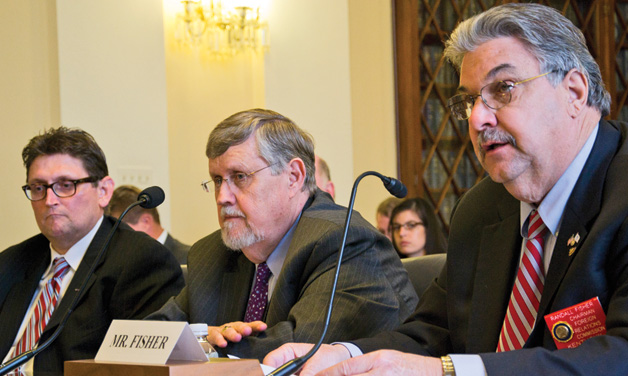
Kentucky service officer Randy Fisher testified on Capitol Hill that improved medical understanding can reduce the backlog.
American Legion service officer Randy Fisher says that while VA claims processors are adequately educated in procedures, data collection and software applications, they are often short on medical knowledge like bone structure, muscle systems, basic anatomy and physiology.
A retired VA nurse manager, Fisher speaks from experience when he says many Legion department service officers are better trained than agency adjudicators who make decisions every day about disability benefits. That problem, he told Congress last spring, contributes to the backlog of unresolved claims.
Testifying before the House Veterans Affairs Committee, Fisher told of one VA claims processor who didn’t know that “extremities” meant “hands and feet,” thus delaying a veteran’s claim and benefits.
Fisher says medical opinions in Compensation & Pension exams do not always come from qualified specialists but from general practitioners, nurses or even social workers. “We think they ought to have a lot more training for the raters at the regional offices. I think they’d understand a whole lot better when someone is talking about tissue damage or muscle damage, so they can actually see the medical physiology side of it.”
Processors “do have quotas, and I think that really puts a lot of pressure on them at the end of the month,” he said. “A lot of times when they adjudicate claims, they don’t dig into it enough to satisfy the claim the first time. And that causes a lot of appeals, and that delays the claims process.”
Besides ramping up training, the Legion wants VA to re-examine the work-credit system it uses for claims processors, which awards bonuses based on the number of claims processed – not on their accuracy.
“As service officers, we are sympathetic to the caseload,” Fisher told lawmakers. “We have to look at every case file for every veteran we see, as well. The difference is, we know that if we miss something, we’re letting a fellow veteran down. Yes, it might take a little bit longer to go over that claims file and make sure everything is in order and we got the claim done right. However, we also know if we got it done right, that claims file is not coming back to our desk.”
In addition to national service officer schools, The American Legion Department of Kentucky provides regular training at posts in the state. “We train on understanding VA examinations because of the number of times we see exams come back improperly, with the wrong forms filled out or the wrong conditions examined,” Fisher said. “We train on areas of the rating schedule where there appear to be inequities, such as mental health disorders, where ratings can be uneven and even seemingly random.”
Fisher says VA could benefit by hiring more veterans to process claims. “The shared sacrifice of shared service is a strong bond. For many veterans, dealing with VA can be dealing with a faceless bureaucracy. Sitting down with a service officer to talk about your claim is sitting down with a real person who has seen the same military you served in. Trust goes a long way.”
- Magazine

